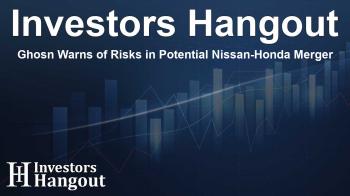Ghosn Warns of Risks in Potential Nissan-Honda Merger

Ghosn's Concerns Over a Nissan and Honda Merger
Recently, former Nissan CEO Carlos Ghosn expressed serious concerns regarding the potential merger between Nissan and Honda. During an interview on a popular financial news platform, he articulated his apprehensions about the implications such a partnership could have on Nissan's operational dynamics and profitability. Ghosn, who previously led Nissan through transformative years, indicated that a merger with Honda might lead to detrimental consequences for Nissan, particularly due to the overlapping operations of the two automakers.
The Risks of Operational Overlaps
In his detailed analysis, Ghosn emphasized that merging two substantial automotive entities like Nissan and Honda could result in what he termed "carnage". He pointed out that significant redundancies exist in their operations, which could force extensive cost reductions. This overlap might necessitate Nissan to undertake severe measures to cut costs, which could ultimately undermine its market position.
Potential Loss of Balance
Ghosn also highlighted the imbalance that might occur should the merger proceed. He fears that Honda could emerge as the dominant partner in the alliance, overshadowing Nissan's contributions. This power dynamic could endanger Nissan's identity and strategic direction, something he worked hard to elevate during his reign.
Concerns About Strategic Complementarity
Further discussing his apprehensions, Ghosn noted that the merger appears to lack strategic complementarity. He argued that while some synergies could be achieved, they predominantly revolve around cutting costs rather than enhancing innovation or market reach. This fundamentally challenges the viability of the partnership, given that cost reductions typically arise from downsizing operations, a scenario that Nissan would likely face as the subordinate party.
Lessons from Previous Alliances
Comparing the situation to Nissan's past experiences, Ghosn recalled the alliance formed with Renault. He reasoned that the partnership with the French automaker offered more synergistic benefits, primarily due to a more balanced relationship that facilitated mutual growth. The contrasting nature of the proposed Nissan-Honda merger amplifies his concerns about potential operational drawbacks and strategic misalignment.
Nissan's Future in a Changing Landscape
As the automotive industry evolves rapidly, the stakes are high for major manufacturers like Nissan. Ghosn's insights underscore the necessity for firms to carefully evaluate partnership opportunities, ensuring alignment in technological goals and operational strategies. With Nissan's identity and future at stake, leaders within the company must consider Ghosn's warnings seriously and analyze the proposed merger in detail.
Ghosn's Legacy and Current Situation
Since escaping to Lebanon, Ghosn has remained a controversial figure in the automotive industry. His reflections on Nissan's potential future carry weight from his long history and experience in leading the company through crucial transitions. As discussions about the merger continue, stakeholders will be keen to see how these insights influence decisions made by Nissan's current management.
Frequently Asked Questions
What are Ghosn's main concerns about the Nissan-Honda merger?
Ghosn is worried about operational overlaps and significant cost-cutting measures that could adversely affect Nissan, potentially making it the weaker partner in the alliance.
How does Ghosn compare the Honda merger with the Renault alliance?
He believes that Nissan's previous partnership with Renault had a better balance and complementarity, which provided mutual benefits rather than primarily focusing on cost reductions.
What does Ghosn mean by 'carnage' in a merger context?
By 'carnage,' Ghosn refers to the severe operational disruptions and job cuts that could arise from merging two similar companies with overlapping functions.
What implications does Ghosn believe the merger could have on Nissan's identity?
Ghosn fears that the merger could overshadow Nissan's contributions, stifling its strategic direction and weakening its competitive positioning in the market.
Where is Carlos Ghosn currently living?
Ghosn currently resides in Lebanon after fleeing Japan, where he was facing legal issues. He continues to be a prominent voice in discussions about the automotive industry.
About Investors Hangout
Investors Hangout is a leading online stock forum for financial discussion and learning, offering a wide range of free tools and resources. It draws in traders of all levels, who exchange market knowledge, investigate trading tactics, and keep an eye on industry developments in real time. Featuring financial articles, stock message boards, quotes, charts, company profiles, and live news updates. Through cooperative learning and a wealth of informational resources, it helps users from novices creating their first portfolios to experts honing their techniques. Join Investors Hangout today: https://investorshangout.com/
Disclaimer: The content of this article is solely for general informational purposes only; it does not represent legal, financial, or investment advice. Investors Hangout does not offer financial advice; the author is not a licensed financial advisor. Consult a qualified advisor before making any financial or investment decisions based on this article. The author's interpretation of publicly available data shapes the opinions presented here; as a result, they should not be taken as advice to purchase, sell, or hold any securities mentioned or any other investments. The author does not guarantee the accuracy, completeness, or timeliness of any material, providing it "as is." Information and market conditions may change; past performance is not indicative of future outcomes. If any of the material offered here is inaccurate, please contact us for corrections.
